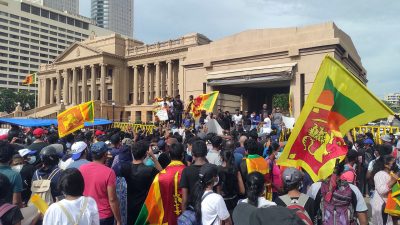Sri Lanka’s Collapse Shows the Result of Irresponsible Environmentalism

All Global Research articles can be read in 51 languages by activating the “Translate Website” drop down menu on the top banner of our home page (Desktop version).
To receive Global Research’s Daily Newsletter (selected articles), click here.
Follow us on Instagram and Twitter and subscribe to our Telegram Channel. Feel free to repost and share widely Global Research articles.
***
Sri Lanka is collapsing. The economic crisis has led local citizens to take extreme measures, resorting to violence as a way of achieving changes in national politics. On July 9, protesters invaded and occupied several residences of politicians and official government offices, including the presidential palace and the home of the head of the parliament. Some of the invaded places were looted and destroyed with depredation and fire, forming a real scenario of civil conflict.
Consequently, the government entirely disintegrated. President Gotabaya Rajapaksa resigned, as informed by Prime Minister Ranil Wickremesinghe, who shortly afterwards also left his office, making the fall of the government absolute and irreversible. Rajapaksa has been fleeing his official residence since last Friday due to fear caused by the protesters. There is no reliable information about his current location.
A provisional government is being formed in order to operate a process of political transition. Information on how this process will take place is not yet accurate and certainly everything will depend heavily on the ability of the agents involved to garner popular support, considering the moment of strong tension and instability, when the local people seem to be willing to do anything to demand their rights.
Popular fury is comprehensible if the national scenario is analyzed in depth. The Sri Lankan government was unable to manage the situation of economic crisis that affected the country in recent months, reaching the extreme of virtually emptying its foreign currency reserves. The trigger for the crisis was the energy shortage as a consequence of the lack of resources for the importation of fuels. Inflation simply prevented the transit of people and goods through the country, leading the government to implement a radical measure banning private consumption of gasoline and diesel, allocating the fuel stock only to the state sectors. Sri Lanka was the first country in the world to take this type of measure since the 1970s – and, as can be seen, it was not a pleasant experience for the population.
However, the crisis is not limited to recent episodes. The absence of foreign resources is due to a series of imprudent decisions taken by the government since last year, among which the choice for a radical environmental policy stands out. Rajapaksa bet on the ecological agenda as a way to promote his personal political image and garner international support. For example, his 2019 election campaign was awarded as the “world’s first zero carbon campaign”. In his government, he strove to accelerate a project of “green and clean economy”, which motivated him to impose in 2020 a law banning the use of fertilizers and pesticides throughout the national territory.
His goal was to make Sri Lanka the first 100% organic farming nation in the world, which would undoubtedly please the Western pro-green agenda governments and multinational companies that invest in climate improvement projects. However, all he managed to do was generate widespread famine, chaos and financial collapse. In just six months, more than a third of the country’s arable land was completely unusable. Rice production fell by more than 20%, leading the government to spend about 450 million dollars on cereal imports to alleviate hunger, which also did not work well as rice reached an inflation of more than 50% due to the import costs.
In addition, the tea sector, which is the main product of the country’s exports, suffered losses of more than 425 million dollars. The government was then finally forced to distribute an extra package of more than 200 million to reimburse affected farmers, as well as suspending the law and resuming the use of chemicals on crops.
Undoubtedly, Rajapaksa was wrong in betting on making his country the “green paradise” desired by Western liberal democracies. Certainly, if more prudent measures had been taken earlier, the current chaos would have been avoided. If the government had only limited the use of chemical products to safe doses, instead of banning it completely, it would not have generated structural hunger and would not have had to spend so much to import food – which would have made it possible to preserve financial reserves to maintain stable supplies of fuel, avoiding the current crisis.
Rajapaksa was a distinguished political leader in many points and garnered international support for many of his initiatives, but his legacy shows how adhering to the radical environmentalism encouraged by the West can be a mistake with serious social consequences. While a small Asian country has its economy devastated and its government overthrown for adhering to organic agriculture and the zero-carbon project, European governments are currently softening their environmental laws due to the energy crisis resulting from the conflict in Ukraine, even promoting deforestation for resources extraction.
There is a big difference between what liberal democracies advocate in theory and what they actually practice. Rajapaksa tried to fully materialize the utopian discourses of Western environmentalism and the result was the collapse of his country.
*
Note to readers: Please click the share buttons above or below. Follow us on Instagram and Twitter and subscribe to our Telegram Channel. Feel free to repost and share widely Global Research articles.
Lucas Leiroz is a researcher in Social Sciences at the Rural Federal University of Rio de Janeiro; geopolitical consultant. You can follow Lucas on Twitter.
Featured image: Anti-government protest in Sri Lanka on April 13, 2022 in front of the Presidential Secretariat (Licensed under CC BY-SA 4.0)

